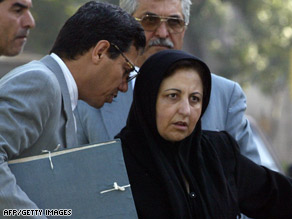Report: Iran postpones trial of seven Baha'is
| Published: | 08.17.09, 13:47 / Israel News |
| An Iranian court has postponed the trial of seven detained Baha'i believers accused of spying for Israel and insulting sanctities, the ISNA news agency reported on Monday.
The trial, which had been due to start on Tuesday, was postponed at the request of defence lawyers, ISNA said, citing the public relations office of the Revolutionary Court, which handles security cases. The news agency did not say whether a new date had been set. (Reuters) |
 (CNN) -- The trial of seven Baha'i prisoners accused of espionage in Iran will begin on Tuesday, despite that one of their lawyers is now behind bars and the other is outside the country, state-run media reported Saturday.
(CNN) -- The trial of seven Baha'i prisoners accused of espionage in Iran will begin on Tuesday, despite that one of their lawyers is now behind bars and the other is outside the country, state-run media reported Saturday.Whether the defendants' attorneys are available will not hinder the start of the trial because other attorney's can be appointed, said Hassan Haddad, the deputy of security affairs for the Prosecutor's Office in Tehran, the Islamic Republic News Agency reported.
The Tehran-based Defenders of Human Rights Center, founded by Nobel Peace Prize laureate Shirin Ebadi, took up the case of the seven Baha'is last year.

Attorneys Abdolfattah Soltani, left, and Shirin Ebadi, shown in Tehran in 2004.
Ebadi, the other attorney representing the seven, was on a speaking tour when Soltani was arrested and has not returned to Iran.
In their stead, two other attorneys at Defenders of Human Rights Center have taken up the case of the two women and five men detained, Ebadi said.
Soltani had an opportunity to leave prison, but under conditions he chose not to accept, Ebadi said. Along with not giving any interviews after his release, Soltani would also have to end his work with the human rights center and no longer support Ebadi. "Mr. Soltani is completely innocent," she said.
The Baha'is are accused of spying for Israel, spreading propaganda against the Islamic Republic and committing religious offenses. The Baha'i International Community, which has a delegation to the United Nations, denies the allegations.
"In the files, in the case basically, there is nothing, no reason that basically convicts them so they have to be released," Ebadi said.
Kit Bigelow, director of external affairs at the American Baha'i Community, said the evidence against the defendants includes communication from Israel, but Bigelow said that is because the Baha'i World Center has its headquarters in Israel. Those communications, she said, is what prosecutors are calling espionage.
Human rights groups have demanded the release of the prisoners, saying the Islamic government has targeted the seven for their religious beliefs.
The Baha'i faith originated in 19th-century Persia, and while modern-day Iran does not recognize it, the government denies any mistreatment of the members of the largest non-Muslim religious minority.
The International Campaign for Human Rights in Iran, however, has reported an intensified persecution of Baha'is in recent years, including cemetery desecration, arbitrary detention, home raids, property confiscation, work expulsion and denial of basic civil rights.
The case of the seven Baha'is has drawn global attention. Roxana Saberi, the Iranian-American journalist freed from Evin prison earlier this year, spoke on their behalf, as have Human Rights Watch and the U.S. Commission on International Religious Freedom, an independent bipartisan federal commission.
The defendants face the death penalty if convicted of the charges against them.
Six of the defendants were arrested in May 2008 at their Tehran homes, and one was arrested in the eastern city of Mashad in March 2008, said Diane Ala'i, the Baha'i International Community's representative to the United Nations. The defendants were held under solitary confinement for the first five months of their incarceration, she said.
The investigation into the charges against the prisoners concluded months ago and the trial was initially scheduled to start in July, but Iran has continued to hold them in Evin prison without access to their lawyers and with minimal contact with their families, Ala'i said.





 ..Israeli Shekel Exchange
..Israeli Shekel Exchange
No comments:
Post a Comment